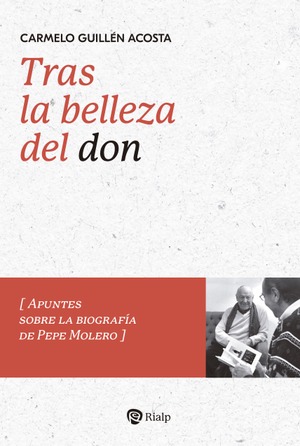The book "Behind the Beauty of the Gift" is a biography, which the author describes as "literary", of a person
Pepe Molero, with whom he shares the fact that he is an aggregate member of Opus Dei.
As the poet Carlos Javier Morales also points out in the prologue, this is not a chronological account of the thousand and one adventures of the biographer. What the author conveys is "the marvelous gift of having met an extraordinary person who has spontaneously helped him to become another extraordinary person" (p. 13).
Behind the beauty of the gift

Molero's biographical plot serves the author to highlight how "the spirituality of Opus Dei impels to holiness in the midst of the world, in the boiling heat of the world's circumstances" (p. 39). Readers of Guillén Acosta's poetry know how well his poems rhyme with the beauty of a common and meaningful life like that of Molero. His latest collection of poems (En estado de gracia, Sevilla, Renacimiento, 2021) is a pure hymn to "the value / that each thing has, however fragile it may be" (p. 13), to the sacredness of matter and the prosaic.
The biography reaches its densest and most poetic, most personal pages, when Carmelo Guillén steps away from the intense hustle and bustle of Pepe Molero's life, and recapitulates and reflects on the thread of the life of a person who has known how to conjugate like few others, in the present tense, the verbs to serve and to love.
Pepe Molero's life is a hymn to the gift of friendship: "A man who, wherever he sits, knows how to integrate himself with great naturalness" (p. 80). Wherever he finds himself, in the constant movement of his life, "he does not feel like a loose verse, abandoned by the hand of God; there he discovers the warmth of the hearts of other human beings who have also made of their lives a gift" (p. 84).
"A vitalist, very vitalist person, enormously enterprising. He continually remembers to live. [...] A willful man, no complainer, determined, creative, one of those who build their existence on the small details, on the small print of the ordinary. [...A person] who has enjoyed and enjoys life like no one else. [...] An all-rounder. Nothing stops him. He's up for anything. He always seems to have been like that" (pp. 112, 116). Those who enjoy Pepe Molero's friendship could say what Juan Ramón Jiménez said of José Moreno Villa: "I don't know what it is about this friend that always comes in handy".
The epigraph provocatively titled "Apology for Lay Celibacy" (pp. 128-132) represents, in my opinion, the "do de pecho" of the biography. For this reason, the length of the quotation (pp. 128-129) will allow me:
When Pepe Molero asked for admission to Opus Dei, he knew that the gift entailed apostolic celibacy to be lived in the boiling heat of the world's square. There is no question of withdrawing to the desert like the hermits, or to a monastery far from the worldly noise.
The call that God proposes to him has as its setting the daily hustle and bustle of the asphalt streets, the crosswalks, the shop windows with sophisticated advertisements, the neighbors' meetings at the entrance of his block, the coffee shop on the corner, the atmospheric pollution, the natural desire for the weekend to arrive for recreation and, of course, the professional work carried out with the greatest possible perfection as an offering to God. That is where he is asked to be and that is where Pepe Molero must be Pepe Molero, the same one who dresses and fits.
He does not doubt it: his thing is that tremor that makes him open the window and greet that neighbor ready to start his car; to be aware of the rise in the price of bread or gasoline; to get lost in a fair in the crowd; to surround himself, if necessary, with frivolous friends who are surprised that he is celibate, attends mass daily, works hard, is always happy, is generous and is ready to serve others and to avoid environments where he is sure that his Love is offended.
The key word of the biography is already in the title: beauty. It portrays "the person of the Work who wants to be faithful to his vocation and is enthusiastic about the beauty of the ordinary, lived to the full" (p. 165), "always relearning the nuances of wonder and eagerness and continually making of his existence a hymn of praise to the God of creation, whose beauty has not been denied him: he has known how to accept it, I do not know whether because he was born with the stamp of the tireless wanderer or because the quest
of the instant leads him to always encounter the permanent" (p. 166), with the certainty that God is his end, in the words of Agustín Altisent, "not only after this life, but already now. And he savors it without flames, because it tastes better and is more lasting" (p. 167).
In the omnipresent culture of suspicion in which we are comfortably ensconced, a culture "according to which every Beauty is a deception that must be unmasked; [... culture] that sees in virtues lies and in vice a manifestation of sincerity" (Catherine L'Ecuyer), biographies such as that of Carmelo Guillén Acosta incite to discover the beauty that is solidly integrated in truth and goodness. This is the purpose imposed by the biographer when writing this book: "To sing an ordinary life, without apparent brightness, lived in its fullness, in its joy". And for this, the life of Pepe Molero, "from the gift of his vocation" (p. 174), has come to him like a ring to his finger.








